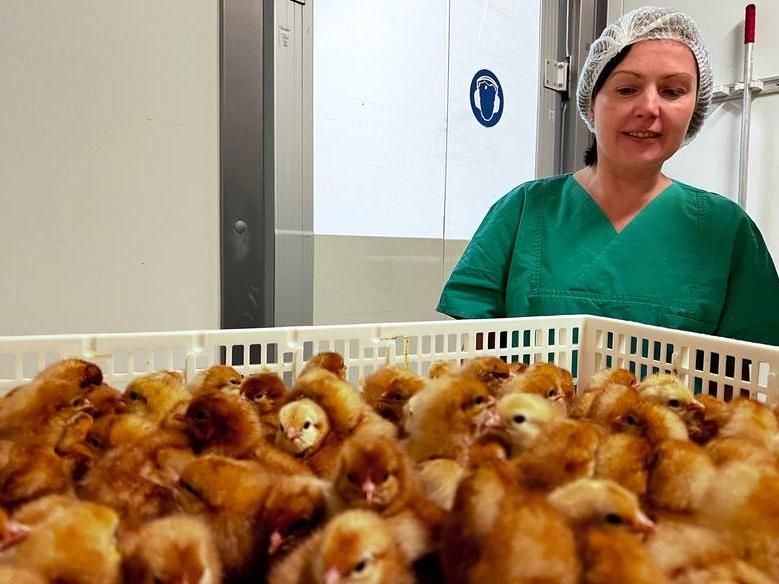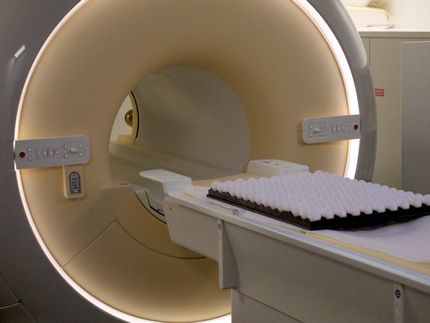Researchers now determine embryo gender without damaging the egg
An important milestone on the way to industrial use in hatcheries
Advertisement
Mathematician Professor Dr. Helene Dörksen and her team from the Institute for Industrial Information Technology (inIT) have improved the method they developed for determining the sex of chicken embryos. With an accuracy of 98 percent, the sex can now be determined without damaging the eggshell. This eliminates a stress factor for the embryos, and for the process itself it is an important milestone on the way to industrial use in hatcheries.

Professor Helene Dörksen with male chicks. The photo was taken recently at a hatchery near Cuxhaven, which already uses a method for sexing embryos in chicken eggs on the 13th day of hatching.
TH OWL
The team led by Professor Dr. Helene Dörksen has succeeded in taking a decisive step towards industrial use in determining the sex of embryos in chicken eggs. "Until now, to use time-resolved laser-induced fluorescence spectroscopy, we had to remove the lime from the shell at a small spot on the egg. This was costly and at the same time a considerable stress factor for the embryos. Now we can scan the eggs undamaged with our method," says the professor from the Institute for Industrial Information Technology (inIT) at the Ostwestfalen-Lippe University of Applied Sciences. The results of the series of measurements have not yet been finalized. But there are many indications that the improved method also provides very reliable data. "This brings us a decisive step closer to the industrial use of our method," says the mathematician.
At the beginning of April, a series of tests with 120 eggs was carried out at the institute for the first time. Before that, first 40, then 60 eggs were examined simultaneously. "That's a big challenge for us, to get such a large quantity of eggs and incubate them for three to four days," Dörksen explains. She also says the measurement process itself under laboratory conditions is exhausting. She is now confident that she will be able to meet the poultry industry's requirements of testing up to 500 eggs at a time, step by step. "Under laboratory conditions, however, that is unrealistic," the professor says. One can only speak of industrial production readiness when 100,000 eggs can be measured per day, she adds.
The process itself is not new. University President Professor Dr. Jürgen Krahl applied the measurement method to the analysis of fuels. "In our case, the light beam excites sex-specific substances that start to glow. And this is where mathematics comes into play. We can measure these reactions via the algorithms we have developed," says Helene Dörksen.
Early sexing is important for hatcheries. Since the beginning of 2022, they are no longer allowed to kill male day-old chicks. The procedure allows farms to weed out male chicks before the seventh day of development in the egg. That's what the law requires. Whether the male chicks are then killed or used as breeding and broiler chicks is up to the farm. As part of numerous animal welfare initiatives, several ways have now emerged to compensate for the sale of low-meat roosters, for example through higher egg prices.
As a next step, Professor Helene Dörksen and her team are planning a larger-scale research project to further develop the method, for which she has long since applied for a patent. She also wants to attract funding for this. "We will try with all our might to move forward and accelerate the development process. But we are dependent on financial support here," says the professor. One hatching egg costs two euros, she said, and further, 14 euros must be budgeted for the measurement process alone. All in all, she estimates, it will probably take another three years before the process can be used across the board in industrial hatcheries.
Note: This article has been translated using a computer system without human intervention. LUMITOS offers these automatic translations to present a wider range of current news. Since this article has been translated with automatic translation, it is possible that it contains errors in vocabulary, syntax or grammar. The original article in German can be found here.































































